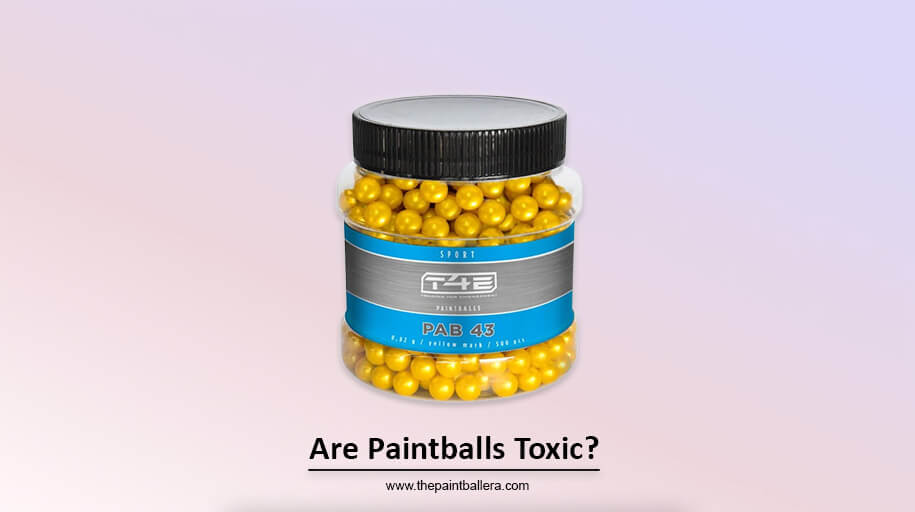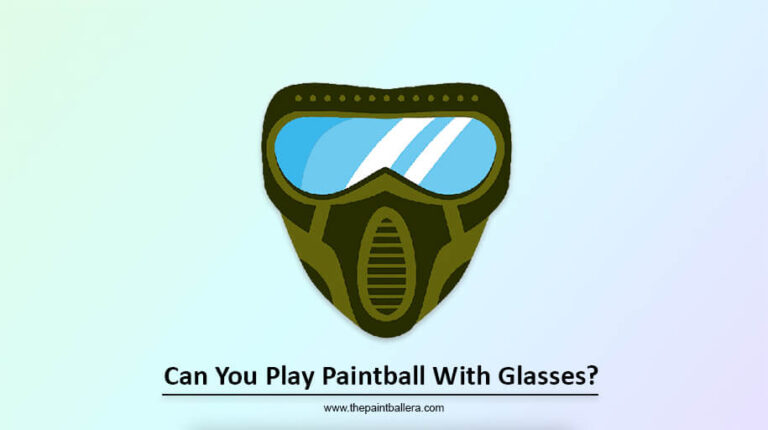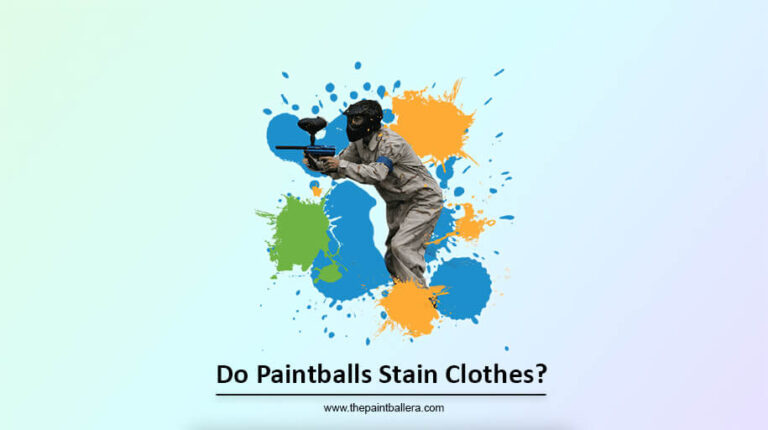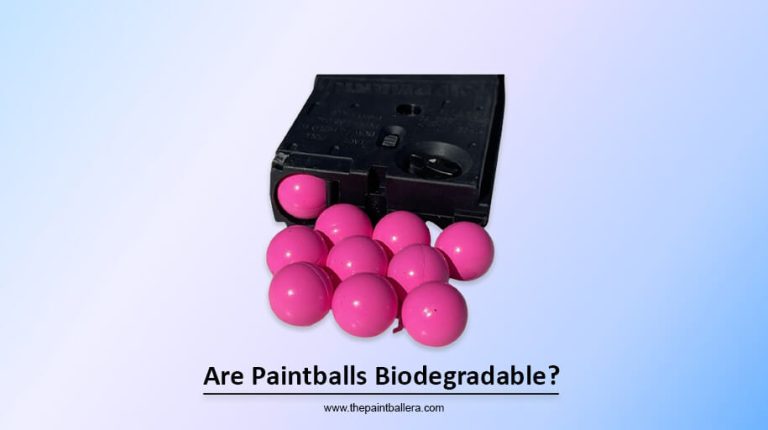Are Paintballs Toxic?

Hey there, paintball enthusiasts and curious minds! Have you ever found yourself in an intense paintball match and suddenly wondered, “Are paintballs toxic?” Yeah, me too. It’s one of those questions that sneak up on you, especially when you’re dodging flying paintballs or seeing your dog eyeing one of them like it’s a colorful chew toy.
This blog post aims to be your go-to guide on this subject, covering everything from the toxicity levels in paintballs to what to do if your pet decides to have one for a snack. Trust me, it’s information you’ll want to arm yourself with before heading into the paint-splattering battlefield.
Are Paintballs Toxic Or Edible: To Humans, Dogs & Other Pets
Are Paintballs Toxic?
First, paintballs aren’t designed to be eaten or ingested, but does that make them toxic? Most paintballs are made of non-toxic food-grade materials, like polyethene glycol.
However, some cheaper varieties might contain substances you wouldn’t want in your system or your pet’s. The paint inside is usually a mixture of food-grade dye and other non-toxic elements, but let’s be clear: “non-toxic” doesn’t mean “good for you” or “edible.”
Are Paintballs Edible?
Which brings us to our next question: Are paintballs edible? The short answer is no. They’re not meant to be eaten. While they generally aren’t toxic, they’re also not food.
Eating them might not send you straight to the hospital, but you could experience discomfort, like stomach upset or a laxative effect. And let’s be honest, with all the other incredible food out there, why would you want to snack on a paintball?
Are Paintballs Toxic To Dogs And Other Pets?
Now, if you’re a pet owner, you know that dogs and cats have a knack for getting into stuff they shouldn’t. The vivid colours of paintballs are tempting for our furry friends. The good news is that most paintballs are not highly toxic to pets.
The bad news is that they can still cause some digestive upset. They can be even more problematic in large amounts, leading to symptoms like vomiting or diarrhea. Bottom line: If you’ve got pets around, keeping paintballs out of their reach is best.
Are Paintballs Toxic To Humans?
So, to get back to humans—paintballs are generally considered non-toxic. Ingesting small amounts, like accidentally getting some in your mouth during a game, probably won’t do much harm. However, large quantities should be avoided.
And don’t make a meal out of them, tempting as the colors may be! In rare cases, some people might experience skin irritations from the paint, so it’s always good to test a small area first if you have sensitive skin.
What To Do If Your Dog (Or Other Pet) Ate Paintballs
Okay, so let’s say your curious pup decides to make a quick meal from some stray paintballs. First of all, don’t panic. Check the paintball label to see if they’re made from food-grade materials.
Even if they are, it’s a good idea to call your vet as a precautionary measure, especially if you notice any signs of discomfort in your pet, like drooling, vomiting, or diarrhea. Keep a close eye on them and, when in doubt, consult your vet for advice tailored specifically to your furry friend.
Some Things You Should Know Related To Paintballs
What are paintballs filled with?
Curiosity got the best of you, too, huh? The “paint” in paintballs is a blend of food-grade dye, water, and sometimes additional elements like wax or gelatin. It’s designed to be washable and easily removed from clothing, which is good news for anyone who doesn’t want to look like a Jackson Pollock painting after a match.
The outer shell is typically made from a gelatin-based substance that allows it to break upon impact, releasing the colorful inner contents.
How to Spot Safe Paintballs?
Ah, the million-dollar question: How do you know you use safe, non-toxic paintballs? When it comes to safety, not all paintballs are created equal. Here are some tips to keep in mind:
1. Look for Quality Brands: Trusted, reputable brands usually ensure their paintballs are non-toxic and safe.
2. Check the Label: Ingredients should be listed on the packaging, so take a look to ensure nothing sketchy.
3. Test for Allergies: If you or someone in your group has sensitive skin, try applying a small amount of the paintball’s contents to a small patch of skin to test for any adverse reactions.
4. Ask Around: Sometimes, the paintball community is your best resource. Chat with other players or field operators to get their recommendations.
In essence, always do your due diligence. If something doesn’t look right or raises a red flag, it’s best to err on the side of caution.
What Happens if You Eat a Paintball?
What to Expect
So, despite all the warnings, let’s say someone you know—or maybe even you (hey, no judgment!)—ends up swallowing a paintball.
What’s going to happen? For most people, ingesting a paintball will likely result in a bad taste in the mouth and maybe some minor stomach upset. But because paintballs can sometimes act as a laxative, be prepared for a potential trip to the bathroom.
However, it’s essential to note that individual reactions can vary, and in rare cases, someone might have an allergic reaction to the contents. If you or someone else has eaten a paintball and you’re worried about it, don’t hesitate to seek medical advice.
The Best and Safest Non-toxic Paintball
Finding the Right Product
If safety is your top concern (and it should be!), you’ll want to invest in the best and safest non-toxic paintballs. So, what should you be looking for? Start with reputable brands known for their quality. You’ll often find that these brands offer paintballs with food-grade ingredients that are biodegradable and safe for the environment.
But it’s not just about what’s inside the paintball; the outer shell should also be considered. High-quality paintballs usually have a gelatin-based shell that is less likely to cause harm if accidentally ingested or put in the mouth.
These shells are typically designed to break more readily upon impact, reducing the risk of injury during a game.
Your Best Bet
Some of the most trusted brands for non-toxic and safe paintballs include Valken, Dye, and Empire Paintball. These brands have a solid track record of delivering safe, high-quality products; many players swear by them.
Are Paintballs Biodegradable?
A Question of Environment
If you’re anything like me, you want to enjoy your time out on the paintball field without leaving a mess for Mother Nature to clean up.
So, the question is: are paintballs biodegradable? The good news is that many brands are leaning towards eco-friendly products, including paintballs made from food-grade, biodegradable materials. These paintballs are designed to break down naturally over time, lessening their environmental impact.
Keeping It Green
Even though many paintballs are biodegradable, it’s still a good idea to clean up after yourself when playing outdoors. Not only is it courteous, but it’s also the responsible thing to do.
How to Take Care of Paintballs
Proper Storage is Key
You’ve invested in high-quality, non-toxic paintballs. Now what? To maintain their integrity, proper storage is crucial. Always keep paintballs in a cool, dry place, away from direct sunlight. Improperly stored paintballs can become deformed, which affects their trajectory and can even cause your paintball gun to jam.
When Good Paintballs Go Bad
Yes, even well-cared-for paintballs have a shelf life. Generally, you’re looking at about four months, although this can vary by brand. If you notice the paintballs looking swollen and discolored or not breaking upon impact as they should, it’s time to let them go.
Conclusion
So there you have it, folks—a comprehensive guide answering the question, “Are paintballs toxic?” and so much more. The key takeaway is that while most paintballs are generally non-toxic to humans and pets, they’re not meant to be eaten.
Always keep an eye on curious pets and children around these colorful orbs. Remember to opt for quality, reputable brands when buying paintballs, and take proper steps to store them.






